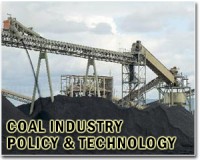| . |  |
. |
Beijing (AFP) June 21, 2010 An explosion at a central Chinese colliery on Monday killed 47 coal miners, state media reported, the latest deadly accident to strike the country's notoriously dangerous mining sector. The blast happened near Pingdingshan city in the central province of Henan when a store of gunpowder kept underground detonated, according to reports citing the State Administration of Work Safety. The accident in the Xingdong No 2 Mine occurred at about 1:40 am (1740 GMT) as 75 miners were at work, 28 of whom were brought to safety, China Central Television said. The remaining 47 have been confirmed dead, it said. An initial police investigation found that the privately owned mine was operating illegally as its mining license had expired on June 6, Xinhua news agency said. Police have detained mine owner Liu Jianguo, it added. Of the 28 rescued, six were hurt seriously including one miner who suffered burns to 78 percent of his body, the official China News Service said, adding that all the casualties were in stable condition. China's vast coal mining industry is notoriously accident-prone due to lax regulation, corruption and inefficiency as mines rush to meet soaring demand. China relies on coal-generated power for about 70 of its electricity needs. A total of 2,631 miners were killed in China last year, according to official figures, but independent labour groups say the actual figure could be much higher as many accidents are covered up to avoid costly mine shutdowns. In March, a flood at the huge, unfinished Wangjialing mine in the industry's northern heartland of Shanxi left 153 workers trapped underground. A total of 115 were recovered alive, in what was seen as a rare successful rescue. Yet despite numerous pledges after that accident and other big mining disasters, there is virtually no let-up in the regular reports of deadly mishaps. Just last September, Pingdingshan was the scene of a mine blast that killed 76 people. At the time officials called for a massive safety review of the city's 157 mines, which were temporarily shut down. Zhao Tiechui, head of the State Administration of Coal Mine Safety, said in February that China would need at least 10 years to "fundamentally improve" safety and reduce the frequency of such disasters. As part of efforts to increase safety standards, the central government has levied heavy fines and implemented region-wide mining shut-downs following serious accidents. But such actions have resulted in the under-reporting of accidents as mine bosses seek to limit economic losses, labour rights groups maintain. The March disaster in Shanxi province prompted more official pledges to make the industry safer, but since then several other accidents have been reported, leaving dozens dead. The issue of mining safety is sensitive in China, as the workers that toil in mines are largely poor migrants. The ruling Communist Party has vowed to protect their interests. Following Monday's accident, Zhao and Luo Lin, the head of the state work safety bureau, travelled to Henan to oversee rescue efforts personally, state media reports said.
Share This Article With Planet Earth
Related Links Surviving the Pits
 Six rescued after three days in flooded China coal mine
Six rescued after three days in flooded China coal mineBeijing (AFP) June 7, 2010 Six miners have been pulled alive from a Chinese mine three days after it flooded, state media said Monday. Two people died and three others are still missing after the flood in the coal-producing heartland of Shanxi province, in the north of the country. The six survivors, all apparently in good health, were brought out of the mine on Sunday to the applause of rescue teams, Xinhua news ... read more |
|
| The content herein, unless otherwise known to be public domain, are Copyright 1995-2010 - SpaceDaily. AFP and UPI Wire Stories are copyright Agence France-Presse and United Press International. ESA Portal Reports are copyright European Space Agency. All NASA sourced material is public domain. Additional copyrights may apply in whole or part to other bona fide parties. Advertising does not imply endorsement,agreement or approval of any opinions, statements or information provided by SpaceDaily on any Web page published or hosted by SpaceDaily. Privacy Statement |